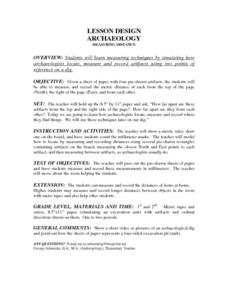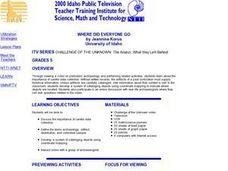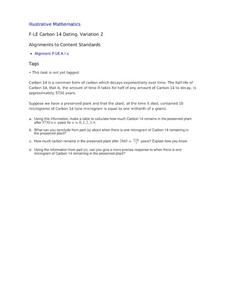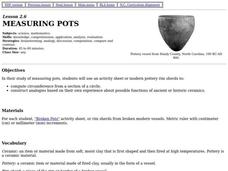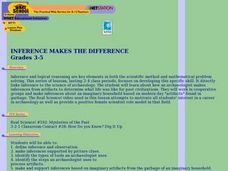Curated OER
The Mathematician And The Archaeologist
Students decorate clay pots and destroy them in order to learn the techniques of modern-day archaeologists and practice mathematical measurements. This is an exciting lesson suitable for Social Studies, Math, Science, or Art classroom.
Curated OER
Classroom Archaeology
Students, in groups, receive a box of artifacts. They record their findings and discuss what the items would have been used for. They come together at the end of the lesson to share their findings.
Curated OER
Dr. Dirt's Archaeology Lab Artifact Analysis
Students simulate analyzing artifacts in archaeological lab by using real techniques that archaeologists use. Students practice measuring skills, drawing, writing, and brainstorming, and make inferences based on evidence.
Curated OER
Archaeology: Digging in the Classroom
Students explore how an archaeologist works and makes discoveries. In this archaeology lesson, students participate in a simulation in which they excavate broken pottery. Students use measurement, geometry, and observation skills during...
Curated OER
Do You Have a Sinking Feeling
Students determine how marine archaeologists use historical and archaeological data to draw inferences about shipwrecks. Students plot the position of a shipwrecked vessel, and draw inferences about the shipwreck from artifacts that have...
Curated OER
Lesson Design Archaeology- Measuring Distance
Students measure and write specific metric distances. In this archaeology lesson, students are given specific artifact locations on a map and measure the distance using millimeters.
Statistics Education Web
Sampling in Archaeology
Compare different random sampling types using an archaeological setting. Scholars collect data from an archaeological plot using simple random samples, stratified random samples, systematic random samples, and cluster random samples....
Curated OER
Where Did Everyone Go?
Fifth graders view a video, and perform related activities on prehistoric archaeology to gain an understanding about the importance of careful data collection. They develop a system of cataloging objects using coordinate mapping to...
Curated OER
Carbon 14 Dating
Evaluating and analyzing exponential functions will help your archaeologists find the amount of Carbon 14 remaining in a plant in this real-life task centered on carbon dating. Learners will also be introduced to the concept of half-life.
Curated OER
Discovering Pi
Students investigate the math concept of Pi (specifically, what pi is, the significance and how it is used in the real world). This is a hands on lesson plan in which the students actively participate with their investigations.
The...
Curated OER
Life in Ancient Mesopotamia
Students reconstruct and make drawings of vessels in the same manner as an archaeologist. In this archaeologist lesson plan, students each get a piece of a broken pot and they have to work together to put it back together. Once it is...
Curated OER
What did I find?
Students excavate an artifact. In this archaeology lesson plan, students get a bucket filled with dirt and a broken up artifact. They work in groups to take it out and to find what its purpose was.
Curated OER
Carbon 14 Dating, Variation 2
Your archaeologists begin this task with a table of values to estimate the time passed based on the half-life of Carbon 14 remaining in a plant. They then move on to find when a specific amount of Carbon 14 is present in the same plant,...
Curated OER
Carbon 14 Dating in Practice II
Your archaeologists combine proportional reasoning with exponential functions in a real-life task centered on Carbon 14 dating.
Curated OER
Carbon 14 Dating in Practice I
Analyzing and evaluating exponential functions will help your archaeologists find the amount of Carbon 14 remaining in a plant in this real-life task centered on carbon dating. Learners will also be introduced to the concept of...
Curated OER
Measuring Pots
Students use an activity sheet to construct analogies about possible function of ancient or historic ceramics and compute circumference from a section of a circle as they study measuring pots.
Curated OER
Archaeology
Students read archaeology books, define it and discover how math and science help us learn about the past. In this investigative lesson students give a description of archaeology and two facts that they learned.
Curated OER
"How to Think Like an Archaeologist" - Suggested Pre-Visit Activity For Historic Jamestown
Learners examine how archaeologists use artifacts to explore other people and their cultures. They discuss types of artifacts, analyze receipts for clues, and discuss how what the items bought reflect about people.
Curated OER
Mapping the Bone Field: An Area and Scale Exercise
Here is an excellent cross-curricular lesson. Learners relate multiplication to area by making a grid on graph paper, and then creating the same grid in real space outside in the school yard.
Curated OER
Making a Fossilized Egg
Students explore fossils by participating in an in class experiment. In this archaeology lesson, students utilize dough and classroom objects to create fossil imprints after hiding the toy/fossil in the dough egg. Students categorize the...
Curated OER
Lesson plan: History Underfoot
Students study Native Americans of Virginia. In this Virginia history instructional activity, students take on the role of archaeologists as they analyze a site and its artifacts. Students use the information to draw conclusions about...
Curated OER
Inference Makes the Difference
Students explore how archaeologists make inferences from artifacts to explore what life was like in the past. In this archaeology lesson, students work in groups and make inferences about an imaginary household based on modern day...
Curated OER
Excavating the Trash
Students look at a day's accumulation of recyclable trash from first through fifth grade classrooms, not knowing which classes it came from. After setting up a collection sheet for data, students remove items from the receptacle and...
Curated OER
Coordinate Grid: Mapping an Archaeological Site
Students examine how archaeologists preserve context of sites through use of rectangular grid or Cartesian coordinate system, and develop sense of distance by pacing off and estimating distances.







